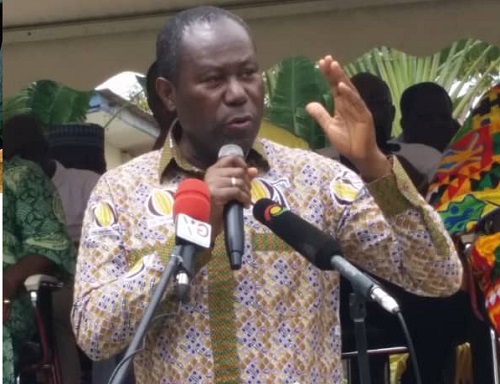Joseph Boahen Aidoo, Chief Executive of the Ghana Cocoa Board (COCOBOD)
The Chief Executive of the Ghana Cocoa Board (COCOBOD), Joseph Boahen Aidoo, has cautioned that failure to pay cocoa farmers a decent income will lead to the collapse of the global cocoa industry.
The persistent inactivity of the international cocoa industry in elevating the concerns of cocoa farmers from producing countries to a high priority, meriting immediate resolution posed an existential threat to the global cocoa trade, he said.
Although, other aspects of the international cocoa value chain have over the decades been strengthened, reformed and made more sophisticated, farmers have remained as vulnerable as always.
Cocoa farmers are vulnerable to market fluctuations which weaken their returns and increase their production risks, he said.
The COCOBOD Chief Executive made these observations while addressing a meeting with European Chocolate makers in Lisbon, Portugal.
He was speaking on the introduction of the Living Income Differential (LID), which is a key component of the new cocoa price mechanism to be implemented by Ghana and Côte d’Ivoire, starting from the 2020/2021 crop season.
“In fact, all of us will agree that the cocoa farmer in our part of the world, that is, in Ghana and Côte d’Ivoire, is the fulcrum of the cocoa value chain, yet this farmer is also the most vulnerable”, he said.
“In various fora, including ICCO meetings, it became very clear to everybody that for us to have a sustainable and thriving cocoa industry, all of us will have to find a living income for the cocoa farmer. A decent income for the cocoa farmer. And price is a major factor in determining this living income or a decent income.”
Mr. Aidoo is of the view that the introduction of LID couldn’t wait, since farmers in the two countries, Ghana and Côte d’Ivoire, were already beginning to abandon cocoa farms for other cash crop farming.
“Therefore, Ghana and Côte d’Ivoire had to take the bull by the horn and try and see how best we can get a price that will enable the farmer remain in operation. A price that will also keep the farmer and his household in good maintenance and also get the farmer the right margin from his/her investment.”
A Living Income Differential (LID) of UD$400 per tonne will be applied to all categories of cocoa beans from Ghana and Cote d’Ivoire starting from the 2020/2021 crop season when the two countries begin to apply a new price mechanism for the sale of cocoa at US$2,600 per tonne.
As part of the roadmap for the implementation of the floor price mechanism, the two countries have agreed that farmers in both countries will be guaranteed a minimum price of 70% of the floor price of US$2,600 per tonne.
This minimum producer price will be legislated in both countries.
When the achieved average Gross FOB price at the end of the Cocoa Season is between the minimum price level of $2,600 and $2,900, farmers will be entitled to bonus payments.
Stabilisation fund accounts will be established under the cocoa initiative of both countries with provisions made in a charter – two accounts will be set up, one for each country, within a Secretariat in Accra.
Any extra value above US$3,000 of the Achieved Weighted Average, which is determined at the end of each fiscal year, will be placed in these accounts.
The only reason for the disbursement of funds from that stabilisation funds will be for the sole purpose of supporting the Achieved Weighted Average if it falls below US$2,200, so that farmers can still be paid that $2,600 per tonne amount.
“We are doing this to ensure that our farmers remain in business and then also to be able to manage their farms well and responsibly, so that, we all meet the objective of having a sustainable cocoa industry, Mr. Aidoo assured the gathering of European chocolate makers.
Finally, he charged them to explore emerging markets and introduce innovative products in order to expand international consumption.


